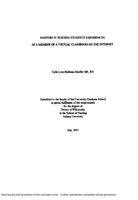Masters in nursing students' experiences as a member of a virtual classroom on the internet
View File(s)
Visitor Statistics
Visits vs Downloads
Visitors - World Map
Top Visiting Countries
| Country | Visits |
|---|
Top Visiting Cities
| City | Visits |
|---|
Visits (last 6 months)
Downloads (last 6 months)
Popular Works for Mueller, Carla L. by View
| Title | Page Views |
|---|
Popular Works for Mueller, Carla L. by Download
| Title | Downloads |
|---|
View Citations
Citations
There is a growing demand for masters prepared nurses to meet the health care needs of the population. However, adult students find that multiple role responsibilities make it difficult to participate in the leisurely pace of the youth-centered model of traditional higher education. Courses in virtual classrooms on the Internet have been established to provide more convenient access to graduate nursing education. However, few attempts at systematically investigating and rigorously assessing the experiences of graduate students involved in courses in virtual classrooms on the Internet have been published. Disciplined investigation of students' experiences is warranted in order to fully explore the meaning of these experiences to those directly involved. The questions posed for this study were: How do students in masters in nursing courses experience education as a member of a virtual classroom on the Internet? What meanings do they attach to that experience? A qualitative inquiry using an interpretive phenomenologic design was used. Network sampling was used to select fifteen participants for this study from those masters in nursing students at a large midwestern university for interviews. Data analysis used a hermeneutic circle and followed the seven stages outlined by Diekelmann, Allen, and Tanner. Five themes and one constitutive pattern were identified. Themes were: (1) Changing Expectations → Adapting to New Roles; (2) Learning the System → Technology's Potholes and Pitfalls; (3) Feeling Overburdened; (4) Is Anyone Really Out There? → Communicating Without Voices; and (5) Learning as a Growing Experience → Recognizing New Strengths. The constitutive pattern was Learning the Ropes: Finding a Way Through the Forest. Participants described learning as much different than previous experiences in traditional on-campus classes and spent much time learning the technology and adapting to a more student centered, reflective mode of learning. Communicating with others without the benefit of body language and voices was difficult. Most students reported a sense of isolation and a feeling that they did not know their classmates well. Students who participated in chat room sessions described knowing chat group members better than other classmates and perceived less isolation.
This dissertation has also been disseminated through the ProQuest Dissertations and Theses database. Dissertation/thesis number: 3024230; ProQuest document ID: 275813692. The author still retains copyright.
This item has not gone through this repository's peer-review process, but has been accepted by the indicated university or college in partial fulfillment of the requirements for the specified degree.
| Type | Dissertation |
| Acquisition | Proxy-submission |
| Review Type | None: Degree-based Submission |
| Format | Text-based Document |
| Evidence Level | Phenomenology |
| Research Approach | Qualitative Research |
| Keywords | Distance Learning; Nursing Students; Educational Software |
| Grantor | Indiana University |
| Advisor | Billings, Diane M. |
| Level | PhD |
| Year | 2001 |
All rights reserved by the author(s) and/or publisher(s) listed in this item record unless relinquished in whole or part by a rights notation or a Creative Commons License present in this item record.
All permission requests should be directed accordingly and not to the Sigma Repository.
All submitting authors or publishers have affirmed that when using material in their work where they do not own copyright, they have obtained permission of the copyright holder prior to submission and the rights holder has been acknowledged as necessary.
Related items
Showing items related by title, author, creator and subjects.
-
Perceptions of graduates from online accelerated pre-licensure second-degree bachelor of science in nursing programs on quality of educational experience and readiness for clinical practice
Jones, Virginia L.There is an increasing use of distance learning methods being utilized for nursing education. Accelerated second-degree Bachelor of Science in nursing (ASDBSN) programs have increased rapidly from 31 in 1990 to 230 in 2013 ... -
What can graduate master's entry nursing students and veterinary medicine students learn from each other?
Adams, Susan L. (2018-06-08)The purpose of this project was to bring graduate Masters Entry Nursing students together with Veterinary Medicine students to learn from each other about pain assessment/management, cross-species infections, death, grief ... -
The effect of a theory course in nursing administration and a subsequent field experience on the profile of leadership style of students in a master's program in nursing administration
Haynor, Patricia M.The purpose of this study was to investigate the effects that a nursing administration theory course and a subsequent field experience of 150 hours had on the profile of leadership style of students enrolled in a master's ... -
An Introduction to Master Instruction for Nurse Educators: Utilization of Principles in the Classroom
Bush, Carrie; Marshall, Amanda (2015-01-15)Session presented on Friday, September 26, 2014: The objectives of the poster presentation are: Outline selected principles of master instruction from Dr. Ken Bain. Describe the current use of master instruction principles ... -
Excellence in Nursing Education & Research [Complete issue : Second Quarter 2002, Vol. 3, 2]
Mueller, Carla L.; Wykle, May L.; Sigma Theta Tau International (Sigma Theta Tau International, 2002)Publishing History: Nursing Excellence published yearly in 1998 and 1999. The publication became Excellence in the first quarter 2000. It transitioned to Excellence in Nursing Education, Excellence in Nursing Administration, ...





